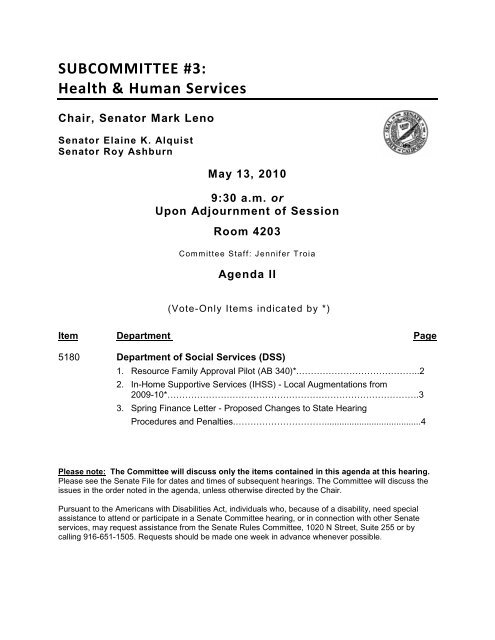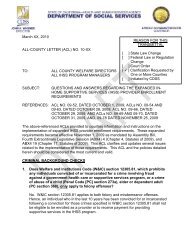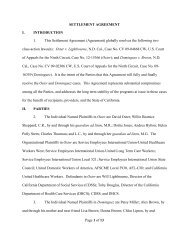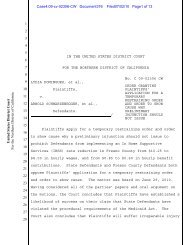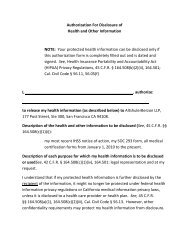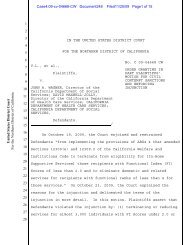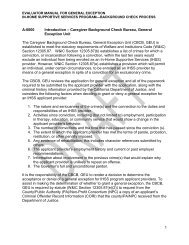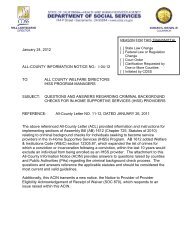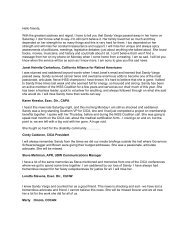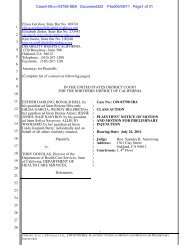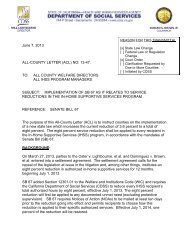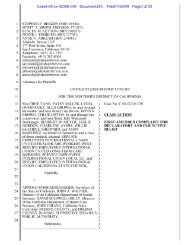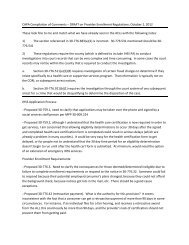from King v. McMahon and Ball - California Association of Public ...
from King v. McMahon and Ball - California Association of Public ...
from King v. McMahon and Ball - California Association of Public ...
You also want an ePaper? Increase the reach of your titles
YUMPU automatically turns print PDFs into web optimized ePapers that Google loves.
SUBCOMMITTEE #3:Health & Human ServicesChair, Senator Mark LenoSenator Elaine K. AlquistSenator Roy AshburnMay 13, 20109:30 a.m. orUpon Adjournment <strong>of</strong> SessionRoom 4203Committee Staff: Jennifer TroiaAgenda II(Vote-Only Items indicated by *)Item Department Page5180 Department <strong>of</strong> Social Services (DSS)1. Resource Family Approval Pilot (AB 340)*.…………………………………..22. In-Home Supportive Services (IHSS) - Local Augmentations <strong>from</strong>2009-10*………………………………………………………………………….33. Spring Finance Letter - Proposed Changes to State HearingProcedures <strong>and</strong> Penalties.………………………….......................................4Please note: The Committee will discuss only the items contained in this agenda at this hearing.Please see the Senate File for dates <strong>and</strong> times <strong>of</strong> subsequent hearings. The Committee will discuss theissues in the order noted in the agenda, unless otherwise directed by the Chair.Pursuant to the Americans with Disabilities Act, individuals who, because <strong>of</strong> a disability, need specialassistance to attend or participate in a Senate Committee hearing, or in connection with other Senateservices, may request assistance <strong>from</strong> the Senate Rules Committee, 1020 N Street, Suite 255 or bycalling 916-651-1505. Requests should be made one week in advance whenever possible.
Subcommittee #3 May 13, 2010appropriated for the state-level activities, the Administration determined that nocorresponding local pilot activities would take place.Subcommittee Staff Comment <strong>and</strong> Recommendation: It appears that theAdministration may have overstepped its bounds by assuming that the Administrationitself was authorized to determine the sufficiency <strong>of</strong> funding appropriated for thisprogram (i.e., the very same authority the Administration explicitly sought in the 2010-11budget <strong>and</strong> that the Subcommittee recently rejected). Staff recommends that theSubcommittee restore, in 2010-11, local assistance funding for this program. Staffshould be directed to work with the Administration, Legislative Analyst’s Office (LAO),<strong>and</strong> County Welfare Directors <strong>Association</strong> (CWDA) to determine the amount <strong>of</strong> thisrestoration. In addition, to ensure appropriate implementation <strong>of</strong> the pilot, staff furtherrecommends that the Subcommittee authorize some, but not all, <strong>of</strong> the previouslyrequested limited-term positions at DSS. Specifically, limited-term state operationscosts shall not exceed $150,000 GF annually.DSS Issue 2: In-Home Supportive Services (IHSS) – LocalAugmentations <strong>from</strong> 2009-10Budget Issue: Of the $54.2 million ($21.9 million GF) in new funding for DSS <strong>and</strong>county IHSS anti-fraud/program integrity efforts in 2009-10, $10 million GF was setaside for “additional fraud prevention, detection, referral, <strong>and</strong> investigation” at the locallevel. With matching federal <strong>and</strong> county funds, the total amount available statewide forthose additional local efforts was $26.4 million. (For more information on overall IHSSanti-fraud/program integrity efforts statewide, please see the March 18, 2010 Agenda.)The Governor’s 2010-11 budget proposes an additional $28.3 million ($10.0 million GF)to provide this augmentation again in the budget year.Budget Bill Language (BBL) Authorizing 2009-10 Augmentation: Thisaugmentation was enacted by Section 576 <strong>of</strong> ABx4 1 (Chapter 1, Fourth ExtraordinarySession, Statutes <strong>of</strong> 2009), which added Section 18.55(b), copied below, to the BudgetAct <strong>of</strong> 2009:(b) The sum <strong>of</strong> $10,000,000 is hereby appropriated <strong>from</strong> the General Fund inaugmentation <strong>of</strong> Schedule (2) <strong>of</strong> Item 5180-111-0001 <strong>of</strong> Section 2.00 <strong>of</strong> theBudget Act <strong>of</strong> 2009 for the purpose <strong>of</strong> fraud investigations <strong>and</strong> additionalprogram integrity efforts related to the In-Home Supportive Services Program.The amount appropriated in this subdivision represents the total allowable to beclaimed for these purposes within this section. The State Department <strong>of</strong> SocialServices shall allocate funding based on a distribution method developed inconsultation with the counties. Each county shall submit a plan to the departmentthat includes the program integrity <strong>and</strong> fraud investigation activities that theSenate Budget <strong>and</strong> Fiscal Review Page 3 <strong>of</strong> 6
Subcommittee #3 May 13, 2010county plans to pursue, <strong>and</strong> the department must approve the plan prior todistribution <strong>of</strong> the funds appropriated in this subdivision.Background: As discussed at the hearing on May 6, 2010, forty-five countiessubmitted plans for these additional fraud prevention <strong>and</strong> investigation funds. Thoseplans were developed by County Welfare Directors <strong>and</strong> District Attorneys’ (DAs) <strong>of</strong>fices<strong>and</strong> reviewed by Boards <strong>of</strong> Supervisors <strong>and</strong> DSS.With some minor exceptions when federal or state funds are available, local DistrictAttorneys’ <strong>of</strong>fices are principally funded on a discretionary basis out <strong>of</strong> county GeneralFunds. According to the <strong>California</strong> Department <strong>of</strong> Justice, approximately $1.2 billiontotal was spent on prosecution activities statewide (based on 2006-07 data).Other Anti-Fraud/Program Integrity Measures in the 2009-10 Budget: In addition tothese local funding augmentations <strong>and</strong> the recipient fingerprinting discussed on May 6,2010, as well as previously existing IHSS quality assurance efforts, the 2009-10 budgetincluded the following IHSS reforms, with varying implementation dates:1. Criminal background checks <strong>and</strong> appeals processes for IHSS providers;2. The requirement for providers to attend an orientation;3. Authorization to send targeted mailings to providers <strong>and</strong> recipients <strong>and</strong> toconduct unannounced home visits, pursuant to developed protocols <strong>and</strong> intargeted cases, when there is cause for concern about program integrity;4. Limits on the use <strong>of</strong> P.O. boxes by providers to receive paychecks;5. Training for social workers on fraud prevention;6. Notification to providers about their clients’ authorized hours <strong>and</strong> service levels;<strong>and</strong>7. Certifications on timesheets, after notice <strong>of</strong> possible criminal penalties for fraud.Subcommittee Staff Comment & Recommendation: The BBL quoted aboveincluded a one-time appropriation <strong>of</strong> funds for this local augmentation in 2009-10.Given the fiscal crisis facing the state <strong>and</strong> the lack <strong>of</strong> analysis regarding savings thatcan be expected to result <strong>from</strong> these expenditures, staff recommends rejecting theproposed funding to continue this one-time augmentation <strong>of</strong> local activities in 2010-11.Discussion AgendaDSS Issue 1: Proposed Changes to State Hearing Procedures <strong>and</strong>PenaltiesBudget Issue: DSS proposes, in a Spring Finance Letter dated April 1, 2010, twochanges to the state hearings process. The first change would modify the existingSenate Budget <strong>and</strong> Fiscal Review Page 4 <strong>of</strong> 6
Subcommittee #3 May 13, 2010structures for when the state pays penalties to benefit recipients whose state hearingdecisions are not issued in a timely manner. The second would allow state hearings tobe held by video conference, unless there is a finding <strong>of</strong> good cause for a face-to-facehearing. In the alternative, if these changes are not approved DSS seeks $1.4 million($931,000 GF) in additional resources [$900,000 ($431,000 GF) for 6.0 newAdministrative Law Judge (ALJ) positions <strong>and</strong> $500,000 GF for penalty costs].Background on State Hearings <strong>and</strong> Penalties for Untimely Decisions: <strong>California</strong>provides due process to recipients <strong>of</strong> welfare-to-work, Supplemental NutritionAssistance Program (food stamps), Medi-Cal, In-Home Supportive Services (IHSS) <strong>and</strong>Foster Care/Adoption Assistance benefits through state hearings conducted by ALJswho work for DSS’s State Hearings Division. Federal m<strong>and</strong>ates require that the stateadjudicate these claims within 90 days for most programs, or 60 days for food stamps.Existing court orders (<strong>from</strong> <strong>King</strong> v. <strong>McMahon</strong> <strong>and</strong> <strong>Ball</strong> v. Swoap) require the state to paya daily penalty to the claimant for each day over 60 or 90 days, as applicable, that anALJ issues a written decision in a claimant’s favor. The penalty rate starts at aminimum <strong>of</strong> $5.00 per day. In each month that 95 percent <strong>of</strong> all decisions are notcompleted within 90 days, the daily penalty rate increases by $2.50. In each month that95 percent <strong>of</strong> cases are timely decided, the rate decreased by $2.50. The penalties arepaid with 100 percent GF, as no federal financial participation is available.In 2008-09, timeliness was 95.6 percent overall. The most recent information availableindicated that the average timeliness rate for state hearings was 93.9 percent overall.The current daily penalty rates are $7.50 for CalWORKs, $5 for food stamps, $35 forMedi-Cal, <strong>and</strong> $5 for other non-CalWORKs. DSS paid $251,000 GF in penalties in2008-09, <strong>and</strong> $192,000 GF <strong>from</strong> July 2009 through March 2010. DSS projects thatpenalty payments in the current year will likely exceed $500,000 GF. According to DSS,this increase in late decisions <strong>and</strong> resulting penalties is attributable to an increase incaseload without a corresponding increase in staff with which to adjudicate cases. Forexample, <strong>from</strong> 2005-06 to 2008-09, DSS indicates that there was a 23 percent increasein the number <strong>of</strong> hearing requests statewide (<strong>from</strong> 69,825 to 86,079) <strong>and</strong> a 26 percentincrease in the number <strong>of</strong> hearings held. The Department also states that recentfurloughs have placed additional strain on its state hearings capacity.Proposed Changes to Hearing <strong>and</strong> Penalty Procedures: DSS maintains four <strong>of</strong>ficesthroughout the state. However, in some cases, ALJs still have to travel overnight forhearings. To minimize travel, ALJs have recently conducted approximately four percent<strong>of</strong> hearings by videoconference <strong>and</strong> another seven percent by telephone. To participatein a videoconference currently, the parties to the claim still appear at a county hearingfacility. The claimants are currently given the option to have an in-person hearing.According to DSS, less than one percent <strong>of</strong> claimants given that choice to have a faceto-facehearing have exercised it under the current system. The Department now seeksto clarify the law to formalize its authority to continue use <strong>of</strong> video-conferencing t<strong>of</strong>acilitate hearings. Under the proposal, claimants could continue to request a face-t<strong>of</strong>acehearing; however, the request would only be granted if they could show “goodSenate Budget <strong>and</strong> Fiscal Review Page 5 <strong>of</strong> 6
Subcommittee #3 May 13, 2010cause” for the ALJ’s physical presence. According to the Department, good causewould be defined in regulations, after consultation with advocates <strong>and</strong> counties.Under the proposal, the timeliness st<strong>and</strong>ard would also be codified <strong>and</strong> reduced <strong>from</strong> 95to 90 percent. The proposal would additionally establish exemptions for when penaltiesdo not apply. Specifically, there would be no penalties in cases: 1) that do not involve aquestion related to current benefits or services (approximately 60 percent <strong>of</strong> cases), 2)in which the person received benefits at or above the level they were entitled to receivepending the hearing decision, or 3) where the application <strong>of</strong> a recent change in state orfederal law (within the last 12 months) is an issue in the case.Concerns Expressed by Advocates: Some advocates have expressed opposition tothis proposal. Their main concerns center on the ways that they believe the proposalundermines <strong>and</strong> defeats due process. In addition, they raise questions about a number<strong>of</strong> changes included in the proposed trailer bill language – e.g., the elimination <strong>of</strong>reporting requirements established by the courts.Subcommittee Staff Comment & Recommendation: Given the due process-related<strong>and</strong> other significant policy questions at issue in this Spring Finance Letter, staffrecommends that the Subcommittee reject the proposed trailer bill language at this time.Staff does, however, recommend that the Subcommittee approve approximately$450,000 total funds ($215,500 GF) (final amount to be determined after consultationwith the Administration) for three additional ALJs to alleviate workload-related dem<strong>and</strong>s.Questions for DSS:1) Please briefly summarize the reasons for the recent increases in late decisions<strong>and</strong> corresponding penalties. How much <strong>of</strong> the increased delays is likely due t<strong>of</strong>urloughs (which may be about to end)?2) To what extent have you tracked the impact <strong>of</strong> hearings held by videoconference on the timeliness <strong>of</strong> hearing decisions? To what extent have yousought advocates <strong>and</strong> participants’ feedback on these “pilot” activities?3) How prepared would the Department be for the proposed, significant increase inthe use <strong>of</strong> video conferencing? Does the state already have the necessaryquantity <strong>of</strong> equipment <strong>and</strong> technical support?4) What are the circumstances the Department might expect to constitute goodcause for face-to-face hearings? How would participants know that they had theright to request those face-to-face hearings?Senate Budget <strong>and</strong> Fiscal Review Page 6 <strong>of</strong> 6


